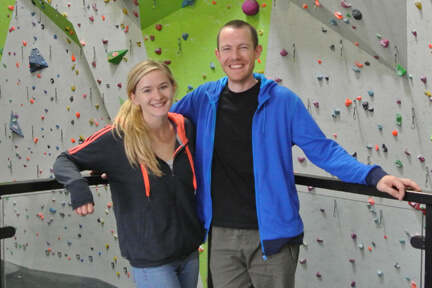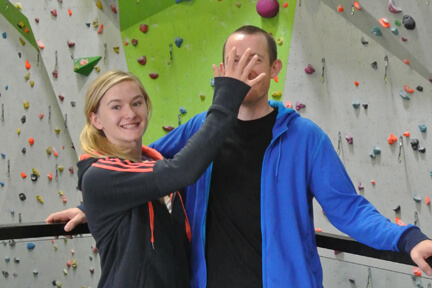A Team of Two

To claim a link between the climbing coaching revolution and Shauna Coxsey’s success on the World Cup circuit may be a tad premature, but it is a wonderful coincidence that Shauna’s World Cup gold medals have come in the first full year of the nationally accredited coaching scheme for climbing.
Mountain Training launched the scheme last October after much consultation and planning. The scheme has three progressive levels: Foundation Coach, Development Coach and Performance Coach. The Performance Coach element is still under construction and the other two are experiencing a successful first year.
The recent BMC Coaching Symposium highlighted some important learning opportunities for some of the UK’s top coaches who came together to share ideas and learn from experts in nutrition, sports psychology and all aspects of climbing coaching.
Let’s not leave it to chance
Shauna Coxey opened the symposium and detailed her journey though the sport from enthusiastic youngster to World Cup winning professional climber. She grew up climbing at a wall in Warrington and was lucky to have been influenced by several top climbers, including John Dunne, and she was constantly pestering them about their technique and footwork. Not all climbers are so lucky, or so inclined to ask, so they find it difficult to improve and either give up or never realise their potential.
Shauna calculated that she completed her 10,000 hours of practice at her first World Cup final placing. You can argue whether the 10,000 hour rule is really credible – but the important thing with Shauna is how she practised. It was all so structured and purposeful, from the age of six. Training coaches to understand how to help our climbers learn more efficiently and get more from their sessions is a crucial feature of the Coaching Scheme. Shauna didn’t “just go climbing,” she knew what to work on. She is the gifted one for working it out by herself. Most other climbers would need a good coach to help them structure their development as they are not so self-aware.

Listening to Shauna’s story and understanding the elements that helped her progress to this stage was fascinating as it highlighted that the Coaching Scheme has hit the nail on the head. It obviously can’t claim credit for Shauna’s success, but it can help develop more coaches who can facilitate more climbers to achieve their potential. That could mean more competing on the world stage and more importantly it will mean more people climbing better and consequently for longer.
Shauna has highlighted the importance on input early in her career which is why we have built the Coaching Scheme from the ground up.
To be partly responsible for the success of any athlete is a dream for many people who spend years studying the elements of sports science: psychology, anatomy, physiology, nutrition, biomechanics and biochemistry. The intriguing thing about Shauna is that she did most things right, as far as her own development was concerned, without actually having a coach. That all changed two years ago after she broke her leg.
Shauna made the decision to take on a professional coach, partly because she’d recognised her own potential and partly through fear that she would either “get fat and lazy or injured and broken.”
“I’m a climber, I’m doing quite well – maybe I should try and be an athlete.”
“I always swore I would hate having a coach, as I hate being told what to do. All of a sudden I had a team. A team of two.”
Changing perceptions
Being a good coach isn’t about telling someone what to do, especially with someone like Shauna who had previously spent years working things out for herself. Asking good quality questions and encouraging a questioning, self-reflective culture in the people you’re coaching is one of the fundamental elements of good coaching. Shauna did not want to be “told what to do;” so as a coach, Mark Glennie finds ways to question her and encourage her to do the same. This skill is something that the Coaching Scheme addresses and which individuals are encouraged to practice.
Learning how to give a good demonstration is one thing. Knowing what to ask the people who were watching you so that they fully understand how to apply that technique to a thousand other scenarios is entirely different.
This is also the same reason why good climbers don’t always make good coaches. “Just because you are a bird, it doesn’t make you an ornithologist.” This quote is from David Epstein (sports scientist, investigative journalist, and author of The Sports Gene) who has interviewed more top athletes than anyone else. In doing so he realised that they all think they know what makes them great, but the one thing they all have in common, is that they often don’t really understand it at all.
Mark Glennie, Shauna’s coach, made all the difference by helping her to finally admit her goals, and what it would take to achieve them. Mark comes from an athletics background where he learned his craft as a high level athlete as well as a coach. He’s also recently joined the Coaching Technical Group to help Mountain Training develop the Performance Coach level in the Coaching Scheme.
Getting it right
Traditional climbing coaching finds it too easy to concentrate on the technical and physical training aspects of performance because they are tangible and measureable. Shauna and Mark’s winning team of two would both admit that the key to their success was sorting out the tactics and psychology of a world class performance – ‘the head game’.
The Coaching Scheme has been designed to train people to take a balanced approach to climbing coaching which address all aspects of performance. Each level includes three key areas: what to coach, how to coach and how to supervise climbing sessions. Each area is explored and expanded as the scheme progresses to allow each coach to develop key coaching skills and the supporting technical knowledge.
Getting it right with young people by following the long term athlete development model is something that coaches will learn during the scheme, but the scheme’s not designed solely for coaching young people or producing high performance athletes. Development at any stage in a person’s climbing career often plateaus after a certain point and making gains beyond that point often requires input from an experienced coach.
Do you have what it takes to be that person? Would you like to find out?